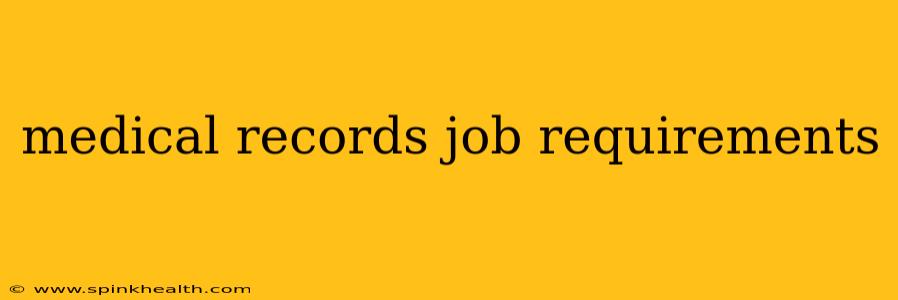Decoding the Medical Records Job Market: A Journey Through Requirements and Responsibilities
The world of medical records is a fascinating blend of meticulous detail and crucial responsibility. It's a field where accuracy isn't just important—it's paramount. But what exactly does it take to land a job in this vital area of healthcare? Let's unravel the common requirements and explore the day-to-day realities of this often-unsung hero role.
My journey into understanding medical records job requirements began with a simple Google search. I quickly realized the landscape is diverse, encompassing roles from entry-level clerks to highly specialized coders and analysts. The common thread? A dedication to accuracy and a knack for organization.
What are the common educational requirements for medical records jobs?
Many entry-level medical record positions, like a medical records clerk, might only require a high school diploma or equivalent. However, the field is increasingly demanding more formal education. An associate's or bachelor's degree in health information management (HIM) or a related field is becoming increasingly common, particularly for more advanced roles. These programs provide in-depth knowledge of medical terminology, coding systems (like ICD-10 and CPT), and regulatory compliance.
What are the typical skills needed for a medical records job?
Beyond education, specific skills are critical. Think:
- Medical Terminology: Understanding the language of medicine is fundamental. You'll be dealing with diagnoses, procedures, and medications daily.
- Coding and Classification: Familiarity with coding systems like ICD-10 (for diagnoses) and CPT (for procedures) is crucial for accurate record-keeping and billing. This often requires specialized training and certification.
- Data Entry and Management: Accurate and efficient data entry is paramount. You'll be handling sensitive patient information, so accuracy and attention to detail are non-negotiable.
- Electronic Health Record (EHR) Systems: Proficiency in various EHR systems (like Epic, Cerner, or Meditech) is highly sought after. Many roles require training and certification specific to these systems.
- Record Maintenance and Retrieval: Organizing, storing, and retrieving patient records efficiently is a core responsibility.
- Compliance and Confidentiality: Understanding HIPAA regulations and maintaining patient confidentiality is absolutely vital.
- Software Proficiency: Proficiency in Microsoft Office Suite and other relevant software is usually required.
What soft skills are essential for a career in medical records?
Technical skills are important, but don't underestimate the value of soft skills:
- Attention to Detail: Accuracy is non-negotiable in this field. Even a small mistake can have significant consequences.
- Organizational Skills: Managing large volumes of data requires exceptional organizational abilities.
- Problem-Solving Skills: You'll encounter challenges regularly, requiring creative problem-solving.
- Communication Skills: Interacting with physicians, nurses, and other healthcare professionals requires clear and effective communication.
- Teamwork: Medical records departments work collaboratively, requiring strong teamwork skills.
Are there specific certifications beneficial for medical records professionals?
Yes! Certifications demonstrate competency and can significantly boost your career prospects. The Registered Health Information Technician (RHIT) and Registered Health Information Administrator (RHIA) certifications, offered by AHIMA (American Health Information Management Association), are highly valued.
What is the job outlook for medical records specialists?
The job outlook for medical records specialists is generally positive, driven by the increasing reliance on electronic health records and the growing demand for healthcare services. However, the specific demand varies depending on location and the specific role.
My journey through understanding the medical records job market has highlighted the blend of technical skills, academic qualifications, and essential soft skills needed to thrive in this critical healthcare domain. The path to a fulfilling career in medical records starts with dedication, a commitment to accuracy, and a passion for contributing to the overall well-being of patients.

